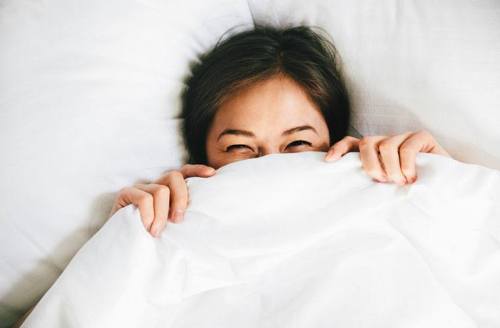Being in a chilly room when you’re trying to fall asleep might seem like the last thing you would want, but those colder temps are actually your best bet for getting the proper amount of shut-eye.
Adam Tishman, Helix mattress co-founder and sleep expert, told The Thirty the ideal temperature for passing out comfortably isn’t at all warm and cozy. It’s actually between 60 and 68 degrees Fahrenheit, which helps your body set its internal temp at a little lower than the everyday average of 98.6 degrees, AKA the key for optimal sleep.
“When you near bedtime, your body begins to cool down by about one to two degrees to get into sleep mode. In general, sleeping in a cool environment will help you maintain this lower body temperature, which in turn will help lull you into a longer, deeper sleep.” —Adam Tishman, sleep expert
“When you near bedtime, your body begins to cool down by about one to two degrees to get into sleep mode. In general, sleeping in a cool environment will help you maintain this lower body temperature, which in turn will help lull you into a longer, deeper sleep,” Tishman said. “Warm temperatures not only cause uncomfortable night sweats and overheating, but they also prevent you from hitting that lower body temperature ideal for sleeping.”
So how does one achieve the perfect temperature every night? Tishman has three tips that will help you pass out like a baby.
Check out 3 bedroom hacks to make sure your bedroom is suitable for shut-eye.
1. Reclaim your space
You might want to upgrade to a bigger bed size. The more you can spread out, the cooler you’ll be, and the faster you’ll be able to fall asleep. Or just try to limit your spooning time, whether you’re alone or with a partner (or robot!). Unless you’re on the cutting edge of sleep tech and have a dual-paneled cooling sleep-tracking device, that is.
“Keeping your limbs far away from each other can help keep you cool and prevent the transfer of heat throughout your body,” Tishman said.
2. Rethink your mattress
Shopping for a mattress might sound as simple as picking the most comfortable model you’re drawn to, but the material is actually crucial to a peaceful night’s sleep. While some types contribute to heat, like memory foam, others allow for better airflow, like polyurethane foam, microcoils, Tishman said.
3. Upgrade your sheets and pillows
But your mattress material isn’t the only thing that matters when it comes to your bedroom sanctuary. Your pillows and your sheets also make a big difference in your sleep quality.
“Cotton sheets are a good choice, as the material is breathable and promotes airflow,” Tishman said. “Additionally, pillows with special cooling covers can help keep you cool throughout the night.”
Silk sounds like a great (and luxe!) temperature-regulating place to start.
Here’s why using a planner could help you sleep better. Also, learn why getting more sleep could help curb your sugar obsession.
Sign Up for Our Daily Newsletter
Get all the latest in wellness, trends, food, fitness, beauty, and more delivered right to your inbox.
Got it, you've been added to our email list.











